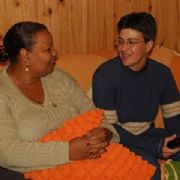The demand by homosexuals for the recognition of the possibility of people of the same sex living in a stable union, in the same way as heterosexual couples, so that they can form a family nucleus, is not new. Recent decision of the Superior Court of Justice (STJ), which confirmed decisions of 1st and 2nd instances, giving a woman from Bagé (RS), the right to adopt two boys, adopted children of her partner, should set new precedents and modify the Family Law in Brazil.
Homosexuals have long sought to solidify their rights with the Legislative Branch, through bills that tend to be forgotten and always neglected. Politicians are more interested in judging issues other than this, which is quite controversial and strongly opposed by religious groups, which insistently obstruct its approval.
The bill that gave rise to the new Adoption Law No. 12.010/2009 included in one of its articles the express provision that homosexual couples could adopt. Under pressure from religious groups, the project was approved with the deletion of this article. In addition to the lack of legal provision, politicians intend to prohibit adoption by same-sex couples through bills. This is the case of deputy Zequinha Marinho (PSC-PA), author of project nº 7018/2010, which proposes to change the Child and Adolescent Statute (ECA), inserting such a prohibition in the text.
However, politicians opposed to adoption by homosexual couples have seen their prejudiced ideals fall. See the decisions handed down by the Superior Court of Justice, the Court of the State of Mato Grosso and São Paulo, successively, all within a 10-day interval.
The first of them took place on April 27th of this year and was handed down by the STJ, which granted a resident of Bagé (RS) the right to adopt two boys, the adopted children of her partner. A day later a decision came from the TJ-MT, granting the same right to a man whose partner had already adopted a child. At the beginning of May, the TJ-SP granted the same right to a woman who lived with her partner, the adoptive mother of a girl.
There were three victories that focused on the well-being of the main beneficiary of the adoption, the child. She is the one who deserves attention and care and, if there is a family structure, even if not identical to those that our laws determine (heterosexual families), there is no reason to deny the child the right to be adopted.
In other words, concluding that there is effectively a healthy and stable family structure, which provides the child with happiness, security and love, there is no reason to justify the separation of those who already live together in a harmonious way. There is no reason to deny them the right to family life since the little ones were granted the happiness, even if informal, of living that way. In addition to the harmony of these children with the family that raised them, adoption by a partner is fundamental in the legal aspect.
A child adopted by only one of the partners establishes legal ties only with him, no matter how close the bonds of affection formed with the person who did not adopt him. She will only be an heir and will only be able to demand maintenance from the adopter; and only the benefits granted to him will the child be able to enjoy.
A common example is the impossibility of including the child in the health plan of the person who also raises the child, but who did not legally adopt the child and, therefore, does not maintain legal ties with the child.
With adoption by a partner, as recommended in recent judgments, the child establishes legal ties with both parents. She will be their heir, being able to demand the same rights from one or the other, enjoying the benefits that both can give her.
With innovative decisions like these, especially that of the STJ as it is a higher court, which has already entered the history of the search for equality and human dignity, everyone won. The family that, whether homosexual or heterosexual, has the greatest function of providing children with the indispensable support so that they develop and grow as good citizens, wins. Citizens who in the future will probably argue that nothing is more important than granting everyone the right to happiness.
* Sylvia Maria Mendonça do Amaral is a lawyer specializing in Homosexual, Family and Succession Law at the Mendonça do Amaral Advocacia office, author of the book “Practical Manual on the Rights of Homosexuals and Transsexuals” and editor of the website Amor Legal – sylvia@smma.adv.br.



